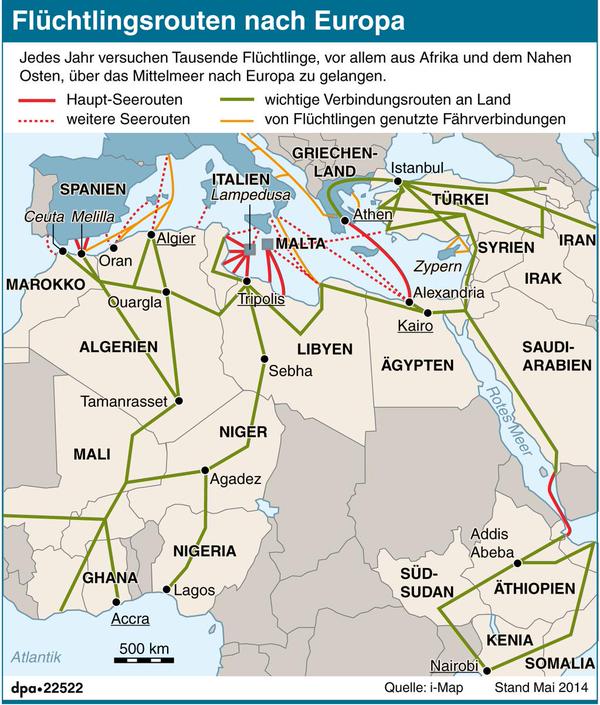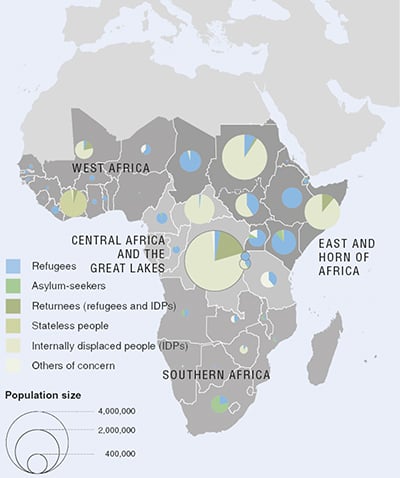We are seeing the shocking result of human trafficing in the Mediterranean. Hundreds of men, woman and children drown as they are shipped (sometimes locked up) on rickety boats from Lybia. Italy, being easiest to reach, has the burden of rescuing these people, and the honour of treating them humanely, and letting many of them in to Europe.

The debate seems to center around how we should stop this stream of immigrants, with more patrolling, harsher treatment of traffickers. Wheter we should distribute those that arrive alive over the whole territory of Europe. There are two solutions that nobody is talking about: 1. Send the people back, drop them on the Lybian shore and 2. Make it easier for them to stop migrating by supporting ways to live along the route.

Lybia keeps immigrants in prison. The situation there is horrible, barely water, sanitation and food. So sending them back should probably be done with some plan to improve those conditions in mind.
But looking at the routes, it’s hard to understand why Nigeria would be a source of refugees because of it’s wealth of oil. Apparently this oil is not used to stabilize its society (maybe a lot to ask as they just recently had real elections). Is Boko Haram chasing people towards Europe? Of course violence and human rights abuses justifies people fleeing, but how far should they have to go?
In general we would assume that if there is local opportunity for employment and a normal life, people would not try to reach Europe (at least not uneducated women with children). Between The main sources of refugees and Europe there are regions in which could be temporary or permanent homes with some help. The closer to the problem zones they can stay, the more likely they will eventually return home.

We are probably underestimating the savagery in some parts of Africa, but there are large parts where there is not much fighting (probably the most resource poor). How hard is it to establish safe zones on de Mediterranean coast? Are warlods in Lybia involved in the trade? Anyway the absolute number of refugees is not that big (not like in refugee camps elsewhere in Africa). Anything would be better than seeing people drown.
Africa needs help, not only against war and violence, but also to cope with climate change. Luckily, with some sensibile interventions it is possible to improve the outcome, in the video above farmers in Mali talk about how simple ‘contour trenching’, or digging ditches perpendicular to the direction of rain water floods, increased the millet yield threefold. That means the land can now carry three times the people! Peter Westerveld pioneered this approach which also includes creation of microclimates and rain/cloud ‘conveyor belts’. He observed that trees create clouds, clouds create rain and so planting trees or simply enabling them to grow through contour trenching can carry water (by cloud) to dry areas, and keep it circulating in the topsoil and atmosphere. The greening effect of this attracts all kinds of life. Simple ditches can thus revive a whole landscape.
Climate change will cause drought in large parts of Africa. The World Bank predicted this and suggested poor farmers would buy ‘rain index futures’. But you can’t insure against continuous drought, and if people run away from the places that climate change makes uninhabitable the process of desertification won’t stop. It is necessary to fight the degradation and drive a change in Africa that makes it a more hospitable continent. This may in turn stem the refugee streams. It may take time, but the only option is to improve things, not run away from them.
Perhaps the approach to providing better food security can be done by Extraeconomic principles. When western companies come in with trucks to build shelters and and poor concrete and such. They may on the one hand just subsidize European companies, and on the other make climate change worse. This is the trouble with any free market economy approach to climate change : Its like trying to put out a fire with gasoline (literally).
You can optimize the cost of renewables to zero
A much better approach is to start with a zone, either inhabited or not, and try to make it an autonomous self sustaining territory. One that doesn’t need to import or export to keep its population alive. This is what we call an Extraeconomic zone.
Fossil fuels used for the harvesting of natural resources is like fuel in a lawnmower, and as long as the fuel doesn’t run out, the lawnmower doesn’t stop
The difference of an extraeconomic zone compared to an economic zone is that there is nobody trying to grab its assets or resources to sell on the global market. There is no banks offering fossil fuel credit seeking interest and contact with the global market is restricted, the bulk of what is produced is not for sale. Its a bit like a plantation, but one for Mother Earth. Even though the people in it may earn a regular wage, the zone as such does not serve the global economy, it only serves the purpose of restoring the atmospheric CO2 balance.
Growing trees for the sake of capturing carbon means you can’t sell them for wood
Examples are large tree plantations that don’t sell the trees, but turn them into charcoal for dumping into the ground (reverse coal mines). Agriculture without fossil fuel fertilizer, aiming to increase soil carbon as wel as growing harvests of CO2 capturing crops, meanwhile sustaining the population in the zone. Creating wealth and biodiversity abundance without the intent to slaughter and sell, only to sustain more life.
You can’t use fossil fuels to restore the climate
It may sound like hippy talk, but it will be necessary, and even desirable. Right now the move towards local autonomy is gaining traction in every corner of the planet. In germany people are subsidized to generate their own solar electricity, store it in their own Lithium batteries for use in the evening, then of course they can (eventually) sell it locally to the water company, or to local restaurants and factories, in effect reducing dependence of activities on more distant sources including the world economy. Renewables being distributed by nature will turn the world in a patchwork of autonomous (but connected) communities.
Dutch Rainmaker Windturbines can provide water where there’s none right now, allowing food to be grown and villages to develop
A special aspect of extraeconomics is that it works any place where there is renewable energy potential (technically anywhere on Earth). Once you have energy you can use it to turn the driest desert into an oasis. This turns the classic idea of economics on its head, which looks for economic factors or locations. This is because fossil fuels are scarce and you have to optimize. With renewables that may still be the case, but rest assured, they won’t stay scarce.
Extraeconomics : Investing money to create a self sustaining community that doesn’t create a return, but only serves the abundance and health of life on Earth
If you apply energy to any place on Earth you can let people live there. A good example (using fossil fuels) is Dubai isn’t supported by its natural surroundings, it was created and is on 24/7 fossil fuel life support. Dubai is just an extreme example, but the world economy as a whole (with its senseless logistics f.i.) is similary on a permanent fossil fuel high.
Fossil fuels being scarce have to be distributed through principles of competition. This means a region that wants it has to sell something to earn the money to buy the fuels (or have the biggest army and a printing press like the USA). Consequence is that only areas where the world economy can extract some resource recieve credit and fuel, the rest has to either scrape by or elect a government that sells their natural/mineral resources. Renewables don’t create these dynamics. They allow for many independent ‘extraeconomic’ zones.
Extraeconomic zones could be designed, created and protected under protection of an alliance of countries like the UN
Extraeconomics says : How can people live here, take care of themselves and restore the environment without help over long periods of time. They can be situated within normal economic regions, or be created in places nobody is interested in, even at sea. This thinking takes a new look at our planet and sees plenty of options to fix global warming and perhaps provide shelter for refugees..